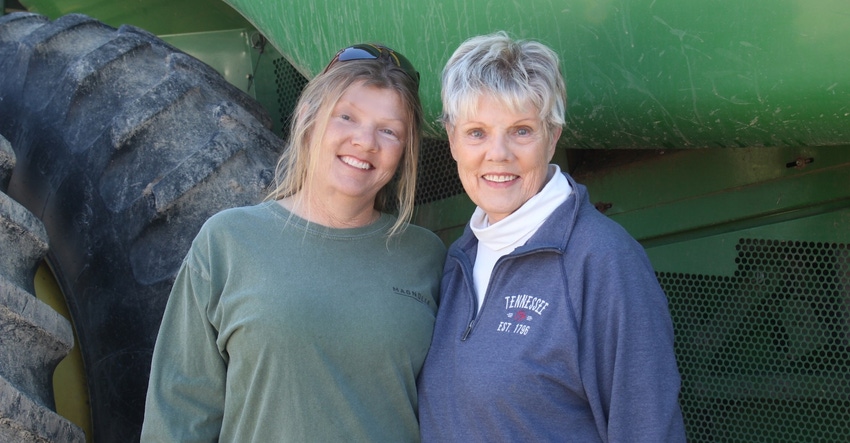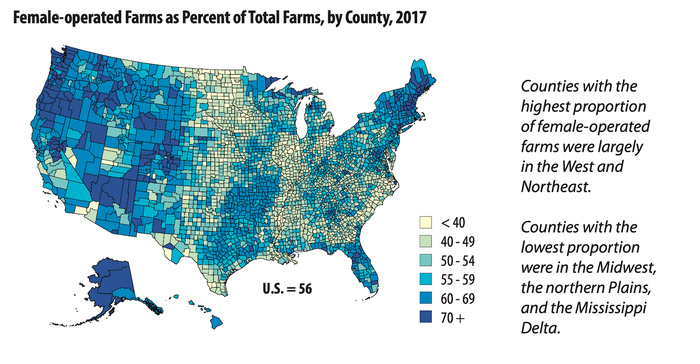
March 8 was International Women’s Day, a time to honor the achievements of women around the world. Women have always played an important role in agriculture, but USDA numbers suggest more women are involved in farming than ever before. The 2017 Census of Agriculture revealed the United States had 1.2 million female producers, accounting for 36% of the country’s total farmers.
In 2019, more than half (51%) of all farming operations in the United States had at least one woman operator, according to the Agricultural Resource Management Survey (ARMS). Women were the “principal operator,” meaning they are primarily responsible for the day-to-day operation of the farm, on 14% of operations.
Beginning in 2017, both the Census of Agriculture and ARMS increased demographic data collection to up to four operators per farm. This has inflated the numbers somewhat, but the calculating change cannot account for all the growth in female operated farms over the last two decades.
The share of female operators varies by commodity specializations. In 2019, the largest share of female operators were found on farms specializing in poultry (67%), while farms specializing in row crop production reported the lowest percentage of female operators (33%).
The distribution of female farmers is also dependent upon region. More female farmers are found in the West and Northeast, while the lowest percentage are reported in the Mississippi Delta, the Midwest and the Northern Plains.

And the pipeline for female farmers and agriculturalists is strong. Since 2010, more than half of all U.S. agricultural students have been women, according to data compiled by the Food and Agricultural Education Information System. That’s a significant shift over the past 30 years.
Ag in the family
Mother-daughter team of Catherine Via and Candi Via-Moore are just two examples of women who are contributing to the success of their farming operation and the agricultural community.
For years Catherine has been an active advocate for agriculture and agricultural education and currently serves as a director-at-large for the Tennessee Farm Bureau Federation. She is an inspiration to many women in agriculture in Tennessee and beyond. Her daughter, Candi, is the fifth generation to farm her family’s land near Bells, Tenn., becoming actively engaged in the operation’s field work and production decisions at a time when few women in the area were.
Catherine grew up on a cotton farm near Savannah, Tenn., where she chopped and picked cotton by hand.
She and husband, Ross, began farming in 1971. While Ross ran the row-crop and livestock operation, Catherine raised three children, worked as a teacher and did what needed to be done on the farm when needed.
“When Candi was a child, I would put her beside me in the tractor. I would put her younger brother Ruste in a blanket in the back window and we would disc and bush hog,” she said, recalling the busyness and sometimes stressful life of a farm wife and mom.
As a teacher, Catherine became involved with Farm Bureau’s Ag in the Classroom. She and Candi continue to host more than 350 local 4th graders for an educational Farm Day each year.
“The younger generations do not know where their food comes from. Educating them on how farmers feed the world is a passion of mine. We need to keep the story of agriculture in the forefront,” she said.
Besides her hands-on work on the farm and promotion of agriculture in the community, Candi said Catherine’s role as encourager at times made all the difference on the family farm.
“It takes a lot to listen to somebody talk about all the stuff that has gone wrong when they come home from the field after a long day �— and something does go wrong every day. To be able to respond with kindness and encouragement means a lot,” Candi said.
In turn, Catherine said she is proud of her daughter’s accomplishments on the farm.
“I can’t say enough about that. She’s very dedicated and works very hard to accomplish the goals that she set,” Catherine said. “She to me is the epitome of self-sacrifice to see that agriculture remains a priority with the Via family and the Via farms.”
Advice for female farmers
When asked what advice they had for fellow female farmers, Catherine was emphatic that more women (as well as more men) need to make their voices heard.
“You say you don’t want to get involved in politics … but you better. You have to be involved in your local community with your planning boards, commodity boards, chambers of commerce. Know your county officials. It helps when you have that connection. We have to work harder to keep agriculture in the forefront because we’re just 2% of the population,” she said.
“I also hope more young women will examine the career choices available in agriculture,” she continued. “There are so many opportunities in livestock, business, marketing. You need good people supporting production. It takes a village to farm.”
"Also, become acquainted with your land grant universities. They provide a foundation for agricultural research. The University of Tennessee Institute of Agriculture has provided our family with timely, scientific based information for our farming operation," Catherine said.
Unsung heroes
Farming is an occupation that involves a great deal of faith. As Candi said, “When you put the seed in the ground, you’re putting your faith in God that your hard work will eventually be rewarded.” During this Women’s History Month, we salute women like Catherine and Candi, who through hard work, dedication and faith contribute to the success of American agriculture.
And if you’ll allow me a personal note, I would like to thank the women in my life who have contributed to agriculture. The ones who worked outside the home but also helped in the fields, cooked the meals, washed the clothes, etc. Especially my mom, who made sure I was able to help with the tobacco harvest even though it “wasn’t work for little girls.” Thank you for letting me know I had a place in agriculture, too.
About the Author(s)
You May Also Like






